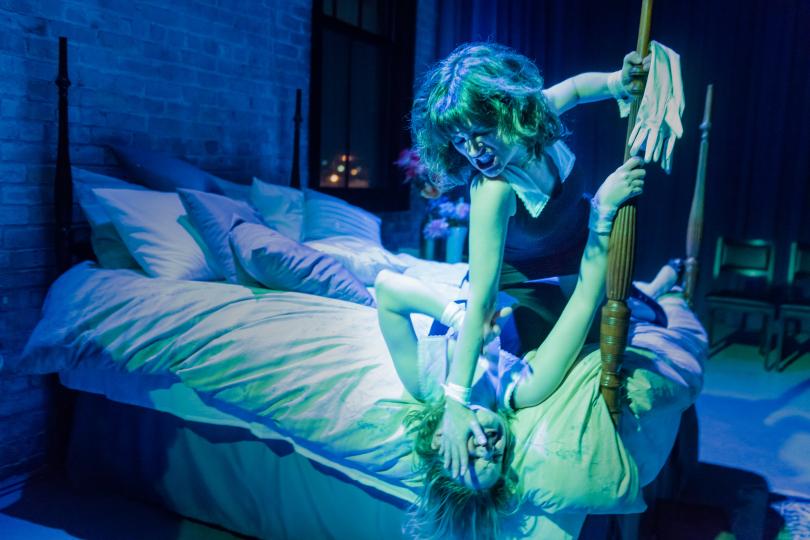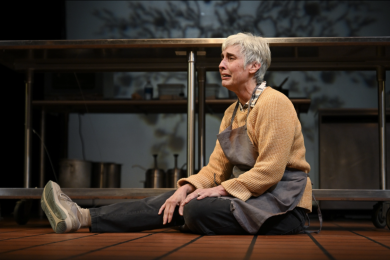Lady Killers in Mid-Century France

Dark & Stormy’s production of Jean Genet’s existentialist/absurdist drama, “The Maids,” features soaring performances by Sara Marsh and Jane Froiland. (Emily Bridges also has a brief but forceful turn in the small supporting role of The Madame.) These rapturous, powerful, performances should not be missed. If you like great acting, you’ve got to see it.
Reviewing this production is problematic. The rehearsal process for the play had been interrupted. Sadly, the original director, Mel Day, became too ill to participate, and had to drop out just before rehearsals began. Dark and Stormy’s artistic director, Sara Marsh, who also plays one of the lead roles, had to step in and take over. Given just how demanding her role of Solange is, this is nothing short of heroic. Marsh’s direction is solid, particularly in the way she was able to generate such superb performances. However, the late replacement of the director should be kept in mind in connection to what I have to say about the production.
Now about the play. Here are the given circumstances. There are two sisters, Solange (Marsh) and Claire (Froiland), who work as housemaids to a wealthy woman we know only as “The Madame” (Bridges). The sisters feel trapped in their jobs; their servitude feels like a prison. We don’t meet The Madame until well into the second half of the play, but we learn earlier that she has a husband who is in prison, she is pampered, and she is patronizing, narcissistic, and thoughtless in her dealings with the sisters. We also learn that the sisters hate her and want to kill her.
Most of the dramatic action in the play consists of the two sisters playing “the games” -- enacting fantasies of domination and humiliation and revenge (on The Madame?, on Society?, on Life?). These games involve rituals of dressing and undressing, of shoe polishing with spittle, and, more broadly, of humiliation and retribution. There is a lot of simulated sex and violence.
Claire pretends to be The Madame, and she dictates orders to Solange, who plays Claire (I think), or maybe just herself. At times, the sisters step out of their “roles.” They taunt each other for failing to carry out the plans they have made to murder The Madame. Finally, Claire determines that now is the time. When Madame comes home, Claire promises, she’ll go to the kitchen and prepare some tea with poison in it. And this time, she’ll go through it. She’ll make sure that The Madame drinks the tea.
I came to the play with a few scattered pieces of information about Jean Genet – stuff I must have absorbed in an undergraduate philosophy course. I knew that before he became a famous writer, Genet he was a criminal, and that after many, many indictments and arrests, he was almost put away for life, but Jean-Paul Sartre and Jean Cocteau got together and applied for a presidential pardon for Genet, on the basis that he was a great writer. Sartre thought that Genet was a genius, and built a theory about pariahhood as a kind of threshold condition for genius to emerge, using, if I am remembering this correctly, Genet as his prime example (in “Saint Genet”). Genet thematized his homosexuality in his writing, and Kate Millet wrote about him in Sexual Politics. And I probably have seen scenes from his most famous play, “The Balcony,” performed in acting classes. That was the background I brought this production of “The Maids.”
Here is my impression. “The Maids” is a very dense, very literary, very conceptually-driven play, one that uses heightened poetic language and piles one metaphor on another. I recognized pieces of existentialist philosophy -- for example, Friedrich Nietzsche’s master-slave narrative is in there somewhere – and there is also a critique of capitalism. The play is about the systematic ways in which capitalist systems sustain themselves, by getting the oppressed peoples to do the work of suppressing and “containing” subversive impulses in themselves and other members of their class. Servitude is presented as a kind of entrapment.
There were probably other subtle messages and arguments that passed me by. Likely, someone with greater expertise in French social thought or French theatre would have gotten more from the play. But I have to say that this production did not do much to help clarify the play’s themes and concerns (including its heavy religious symbolism). There are classics that stand on their own; there are other classics that require intervention to make them accessible and relevant to a modern general audience. That said, the play certainly had its moments. It was rich in dramatic tension and very, very good in portraying the complex and nuanced psychological relationship between the sisters, and between them and The Madame.
One idea that comes through (even to the uninitiated) is that there is (as Sartre might say) no exit from the structures of oppression and exploitation that govern capitalist societies. The sisters, as consumers of a false ideology, are induced to believe that murdering The Madame would make them free. First of all, (SPOILER ALERT) their plan backfires disastrously. Second of all, even if the plan had succeeded, any “freedom” they could achieved would have been ephemeral at best.
There are plays I have enjoyed even when I am out of my depth. This production had extraordinary performances that could be admired, but the overall effect fell short. The play felt at moments like it was trying or expecting to be shocking, but in 2018, references to incest, sado-masochism, sexual violence, and sexual variation do not seem as outrageous as they must have seen when the play was first performed in 1947.
I don’t mind being shocked, and I have no objection to being shocked in the theater. However, I do not like it when I feel that a play is trying to manipulate my feelings. The play’s experimental devices annoyed me. And at times, the maze of metaphors felt like the author was playing hide and seek.
Again, it does not seem fair to fault this production, given the challenges it faced getting on its feet in time to meet the performance schedule. The design elements are all remarkably good – especially the costumes, which evoke an atmosphere of luxury and faint exhibitionism. And I cannot emphasize enough the genius in the performances: Marsh and Froiland offer the best acting I’ve seen in a year of theater-going.




